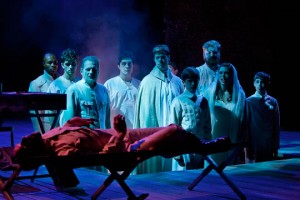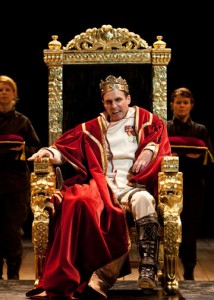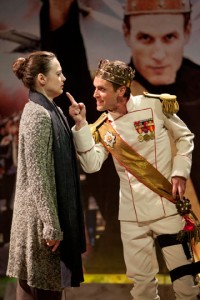‘Richard III’ at The Old Globe, through Sept. 29 A review presented as a one-act coffee house caricature dialogue by San Diego’s most unpredictable theater critic, San Diego LGBT Weekly’s Thom Vegh

Place: Filter Coffee House, San Diego
Time: Another unrelenting sunny day around 10 a.m. (As the curtain rises KIP, an arts writer for a gay weekly magazine, sits staring at his MacBook. He is nursing a double-espresso soy latte.)
KIP (typing): Like its villainous titular character, Richard III limped into Balboa Park in June and remains running in a circle at the Old Globe. (stops typing, to himself) Too, hard an opening. (deletes text, types) Lindsay Posner’s modern dress production of Richard III starts with an explosion of mylar confetti. He and his Richard blow their wad at the evening’s. (stops typing) Too, sexually suggestive. (deletes text, types) Regular theater-goers and Bardolators have seen numerous Richards over the past few seasons. The most recent is Jay Whittaker. His Richard behaves like a nasty spoiled little rich boy who has been locked in his bedroom far too long who bursts out like The Bad Seed, not as the un-“bottled spider” other characters refer. He’s a Class A-A-A sociopath who manipulates his minions to commit his murders. Richard doesn’t stop his villainy when he gets to the throne. He’s a king of war, not peace.
(DODGER LEE ANGER, a 50 year-old haircutter, enters. He is built like a long shore-man with a bleached Dorothy Hamill haircut, overly tattooed for a man his age and speaks with a strained South Carolinian dialect.) DODGER LEE: Why good morning, Kip. Oh, I hope I’m not interrupting you. KIP: You have. I like your new tattoo. Is that Kangi for “forever young?”
DODGER LEE: (snaps) No. It’s Chinese for “harmony!” (with Southern charm) I haven’t seen you since that night at Wicked.
KIP: Your green velvet jump-suit with the open butt was memorable.
DODGER LEE: Why thank you. I had it specially designed.
KIP: I couldn’t imagine it coming off-the-rack.
DODGER LEE: Didn’t I see you at the Old Globe Saturday night?
KIP: Yes.
DODGER LEE: I was there with David. (no response from KIP) I was there with David – Copley. You remember David.
KIP: I never forget a closeted gay Republican. That’s only a rumor. Aren’t you a little old and white for David?
DODGER LEE: His limousine is so comfy and it had a wet bar in it.

KIP: Was that David or the booze?
DODGER LEE: They have a valet now at the Old Globe. A little blonde boy in a smart red vest with the Old Globe logo on it. His name is Brandyn.
KIP: Jack O’Brien would love that.
DODGER LEE: Who? (KIP doesn’t respond) David took me to the Lipinsky Family Suite. It has a no-host bar.
KIP: Family suite – they let you in? Were you still thirsty?
DODGER LEE: You’re just jealous because you can’t drink. Are you still going to those AA meetings?
KIP: Are you still going to Sugar-Daddys Anonymous?
DODGER LEE: The Lipinsky Family Suite is only for donors of $4,999 or more. David is way above that figure. Ooo, don’t look now, Gilbert is coming. How long do you think it will take him to mention he went to Brown University?
KIP: Under a minute. (GILBERT enters. He is pushing 60, has a shaved head, gym body and wears a teal blue polo-shirt with the collar turned up. He carries the New York Times under his arm.)
DODGER LEE: Why, good morning Gilbert.
GILBERT: Good morning you two bon vivant.
KIP: Hey, Gilbert.
DODGER LEE: How was your weekend?
GILBERT: I went to the Globe Saturday night. Sunday I went to an alumni brunch at the del Coronado. You know, the Brown University alums get together every quarter. (KIP and DODGER LEE look at each other.)
GILBERT: How was your weekend?
DODGER LEE: I went to the Old Globe, too.
KIP: I was at Richard III Saturday night as well.
DODGER LEE: Was that your nephew with you? (GILBERT does not respond)
GILBERT: (to KIP) What did you think of the play?
KIP: Well, I … I …
GILBERT: You hated it.
KIP: No, I didn’t hate it. It was confusing and uneven. Unmoving. The acting was … it was like the actors were in three different plays; Shakespeare, Mamet and trailer park Medea.
GILBERT: I though Richard cut a nice figure.
KIP: He’s a cripple and hunch back … to some degree.
DODGER LEE: Can’t a cripple be hot?
KIP: Yes, a cripple – I mean handicapped person – can be hot. I made it once with a guy who had a club foot.
DODGER LEE: I made it with an amputee.
GILBERT: Did he serve in the Korean War?
KIP: I never believed Richard’s disability was real. It wasn’t consistent. When a strong character trait isn’t real it wrecks the illusion.
DODGER LEE: I thought he was hot in the black leather outfit.
KIP: Shakespeare, heck, Richard tells us of his deformity in the first minute of the show: “But I, that am not shaped for sportive tricks, I, that am curtail’d of this fair proportion, Cheated of feature by dissembling nature, Deformed, unfinish’d, sent before my time Into this breathing world, scarce half made up, And that so lamely and unfashionable That dogs bark at me as I halt by them;” He was born prematurely. He’s not sexy; his body is not proportioned evenly; he considers himself ugly; so much so that dogs bark at him. Psychologically, the play is a revenge tragedy Richard inflicts on court and kingdom.
GILBERT: The hunch-back may not be historically accurate.
KIP: That’s possible, but Shakespeare wrote the role as a hunch-back. Whittikar’s portrayal of Richard has three modes; Screaming, ironic and overheated. He tells us: “As I am subtle, false and treacherous.” I didn’t see subtle in his performance.
GILBERT: I see what you mean.
DODGER LEE: Me, too.
GILBERT: A lot of bluster.
KIP: Jay Whittaker is not a bad actor. He’s done his own version of Richard. But he comes out screaming at the very top of the show in that screechy tenor voice and keeps it up for half the evening. I didn’t find the interpretation successful … appealing to my aesthetic.
GILBERT: Amadeus.
KIP: Yeah, he played Amadeus last season with the same voice.
GILBERT: I get the bit about the voice. I thought Amadeus was a grand show.
KIP: It is grand, it has to be grand, it’s the 18th century.
DODGER LEE: The Globe always has beautiful sets and costumes!
KIP: Mucho style doesn’t mean it’s good.
DODGER LEE: What’s wrong with style?
KIP: Nothing. In the theater if style dominates the play without the support of substance, then all you have is meringue without the pie. You’re especially sunk if you’re doing Shakespeare and you’re all about technique.
KIP: (to GILBERT) When did you see Amadeus, what part of the season?
GILBERT: Opening night, of course.
KIP: I saw it months later in September. By the second act Amadeus and Salieri were in a sustained shouting match for 20 minutes. I don’t think the shows are maintained. Richard III has been playing two months and is way out of focus. I don’t think anyone is giving notes to the actors. There aren’t any resident directors. Maybe the show was better opening week. Which would be odd: productions usually grow better over time.
DODGER LEE: This show wasn’t very grand.
KIP: I don’t think it is supposed to be. The director, Lindsay Posner, was going for a totalitarian government, a gritty urban military state. Ralph Funicello’s set is economical and effective. The cement slab monoliths – you know, it’s not easy to make cement look real on stage. Who did the painting? (checks program) Carole Payette. Good job. We don’t recognize the artisans often enough. The graffiti was terrific. She even put in some Banksy graffiti.
DODGER LEE: I liked the gold lamé sofa.
GILBERT: That was fab.
KIP: I really liked it. Gold lamé Louis 15th furniture set against dark grey concrete slabs. That image really evoked class differences. Who did the props? (checks program) Trish Rutter and Rory Murphy. Good goin’.
DODGER LEE: I thought the Old Globe production was good.
KIP: Did you hear what you just said? “The Old Globe.” You and Gilbert talk about going to The Old Globe instead of going to see Richard III. You talk about going to an institution, not a specific play. Institutions aren’t always reliable.

DODGER LEE: Alright, alright. I’m just sayin’ you ought to show some respect. The Old Globe sends shows to Broadway! It can’t be all that bad. I liked the play.
GILBERT: You are the last word in taste, Roger. The point is?
DODGER LEE: Um … The wigs were nice.
KIP: Dodger Lee, can you tell a bad haircut from across the room?
DODGER LEE: I can tell a bad haircut a block away. I’ve been cutting hair for 35 years.
KIP: I’ve been trained in the craft and going to the theater for 35 years and writing for and about the theater for 20 years. I’ve been lucky enough to see the work at the R.S.C., the National Theatre in London and Stratford, Stratford, Ontario, Stratford, Connecticut, the Public Theatre. I played Shakespeare at the Huntington in Boston, the San Francisco Shakespeare Festival and the Halle Theatre. I’m not talking through my hat. Shakespeare’s work is sublime and horrific, this …
GILBERT: It is the Cirqu de Soile of words.
KIP: (frustrated) The director looked good on paper. (reads from program) Royal Court Theatre, an Olivier Award, the Old Vic, the Almeida, the RSC. I would hope a director with this experience would have whipped together a company with better and even acting, especially with the less experienced actors. A big problem has to do with the M.F.A. students.
GILBERT: What do you mean?
KIP: Over half the company is made up of students and non-union actors. I don’t see the Globe branding classical actors as much as they churn out television actor hopefuls. Every couple of years it’s the same types of actors: a Hollywood talent agents roster for T.V. and film markets. They perform like they come from the “Don’t Act, Be Yourself School of Acting.” The students stand and act pseudo-peeved or sullen because they dropped their iPhone. They gesture with one hand then blend into the scenery. They hold submachine guns like cafeteria trays. These students don’t even know what actor presence means. When you’re on stage with Robert Foxworth …
DODGER LEE: The guy from Falcon Crest? I had a crush on him.
KIP: Yeah. He’s in a minor role, but his presence is felt without even speaking. You can be a student actor and have presence. Foxworth is an interesting actor who balances his film and television roles with stage work. That’s more of the British actors’ tradition. (tosses program) When I go to the theater is it too much to expect to be drawn to the edge of my seat and undergo a spiritual transformation?
DODGER LEE: You should go back to drugs.
KIP: Dodger, don’t you have some hair to burn?
DODGER LEE: Come to think of it, yes. Mrs. Bellows, the Colonel’s wife, is my first head. I’ll pick up the National Inquirer for some light reading on my way to work. Bye! (exits)
GILBERT: Did you read the Times review of Richard III for the World Shakespeare Festival?
KIP: Yes. Mark Rylance goes for a “Little Lord Fauntleroy freshly equipped with a lethal tongue.” That might be a parallel with the Whitikar Richard. The review also referred to the performance as a work in progress. I’m sure the director stuck around to keep an eye on it.
GILBERT: Why does the acting bother you so much?
KIP: Gilbert, all you need is a text and the actors for theater to occur. Sometimes, a text isn’t even necessary. Actors can improvise. Commedia dell’arte only used a scenario for performance. When the acting is half-baked, ill-directed or over-rehearsed I find nothing to believe in, even when I’m willing to suspend my disbelief. I’d rather watch people in a café.
GILBERT: Who did you like?
KIP: The old lady and the kid.
GILBERT: I’ll look forward to your review.
KIP: So will I.
GILBERT: I’m off to the gym. I’m doing abs today.
KIP: Bye. (KIP finishes his coffee, types.)
KIP: As septuagenarian Queen Margaret, Robin Mosely rarifies the stage. Ms. Mosely sculpts Shakespeare’s words in the air and speaks the verse as if it has just come to her mind and spoken spontaneously. It is a pity the role is a cameo. In another short-lived role, Edward, Prince of Wales, the nary an adolescent Jonas McMullen surprises with his natural handling of the language. Mr. McMullen performs with conviction and clarity while maintaining genuine precociousness. Curiously, boys played women’s roles in Elizabethan plays. The law prohibited women from performing. It is now clear to me how well the boys handled the job. It is the fading generation and the generation at-the-threshold that give Richard III a glimmer of the wonder on the stage. Curtain.
















I took my wife to see the latest production of Richard III at the Old Globe theatre Friday evening. The very best part of the play was the drive home! Having read several times and seen several productions, I have something with which I can compare. That this production is perhaps the worst of any I have seen I blame totally upon the Director. The actors strut and shout stupidly, “Richard” limps about the stage screaming and spraying spittal, dressed I might add in motorcycle leathers complete with a full leg brace and his left hand held in what is meant to be a malformation. “Actors” stomp about the stage dressed as though outfitted to perform in George Orwell’s 1984 complete with leather jackets, battle dress, high boots and automatic weapons. Toward the end of the play we are presented with a fusillade from this weapons, all in keeping with Shakespeare’s writings! Female cast members appear stupidly in their high heels pumps, shouting lines. All and all I have seen far better high school productions. Money and time totally wasted. As I said, the best part of the play was the drive home!!!
Hey There. I discovered your weblog the use of msn. That is an extremely smartly written article. I’ll be sure to bookmark it and come back to read extra of your useful info. Thanks for the post. I’ll certainly return.